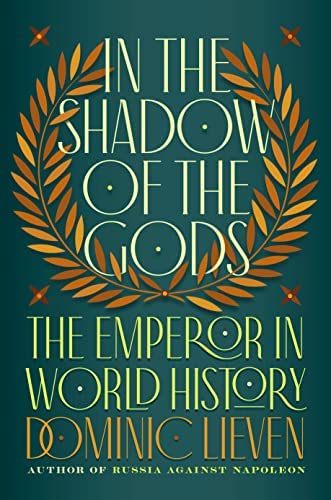Lieven, Domninic. In the Shadow of the Gods: The Emperor in World History. New York: Viking, 2022.
Much of my study of empires and imperialism has been from a geopolitical and economic standpoint. In other words, I usually deal in systems, not symbolism, so when I caught wind of Dominic Lieven’s study of the person of the Emperor in world history, I was intrigued. While certainly ambitious to cover all of human history, such a study had the potential to say intriguing things about the theology, psychology, and propaganda of supreme power from era to era and culture to culture. This may indeed have been what Lieven set out to accomplish, but it most definitely is not what resulted.
In the Shadow of the Gods is essentially a collection of short imperial biographies that conduct the reader through the history of Eurasia through its most famous emperors and, by extension, their empires. Lieven uses four themes to guide these narratives, namely that emperors were (male) human beings, leaders, hereditary monarchs, and ruled over vast swathes of territory. It is in this organizational structure that we encounter the defining flaw in Lieven’s approach: while a comparison of empires throughout history may well yield interesting conclusions concerning such themes as legitimacy, balancing the need for human contact with warding off ambition and corruption, establishing a secure succession, and the unique demands of ruling an empire in an age before instantaneous communication, the decision to simply let these themes drift across a large selection of empires rather than focus on them turn by turn in devoted chapters renders them redundant and largely impotent, bits of trivia rather than hard-hitting arguments.
This flaw is compounded by the fact that Lieven is clearly out of his depth writing such a far-reaching study. As an historian of modern Imperial Russia, his grasp on the definitions of imperial systems is shaky, and at times his parameters are clearly designed to allow him to stay in his topical comfort zones; his argument that polities outside of Eurasia do not offer enough sources to really examine their empires seems weak when his work does discuss such ancient, relatively little-known empires as the Akkadians. Other missteps are just baffling: failure to discuss New Kingdom Egypt in its own right because its core territories were larger than their imperial ones (irrelevant); maintaining that 17th-century Habsburg holdings in Europe constituted an empire (they did not) while the united crowns of Aragon and Castile were not a single kingdom in the same period (they effectively were); even a persistent inability to determine whether he is focusing on emperors or simply powerful hereditary monarchs.
All this organizational confusion might be forgiven, however, if Lieven’s conclusions meaningfully contributed to the modern field. He seems to think that pointing out rulers’ basic humanity and leadership challenges fit this bill, but I wholeheartedly disagree; as a first day in a freshman seminar, it might make for a compelling lecture, but as a monograph In the Shadow of the Gods reads as some odd cross between Gibbon and a modern CEO leadership self-help book. While I’m not arguing that such books shouldn’t exist, I would say that seeing one written by a fellow of Cambridge is disappointing. Similarly out-of-date is Lieven’s hagiography of personality as he explicitly states that he enjoys studying historical figures more when their unique personalities shine through in the sources–a detail that might motivate someone to study history, but has no place in actually writing a monograph.
Yet for all this, I can’t entirely discard In the Shadow of the Gods. The history Lieven covers is by and large good, and written in an engaging manner. If a high school student could stomach its 450+ pages, I might readily assign it as a summer reading primer for an AP World History course. For those who have more than a very basic knowledge of its subject matter, however, there are many other places to look for good world history.
